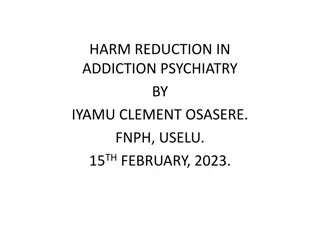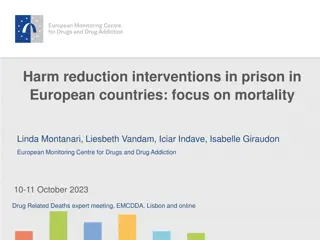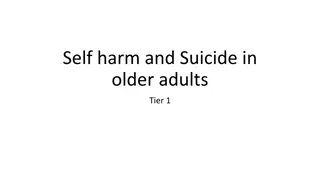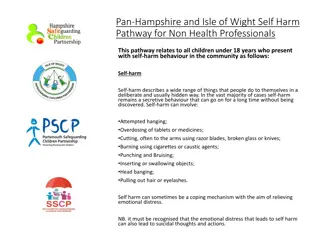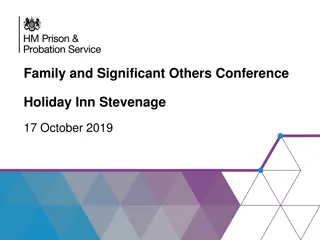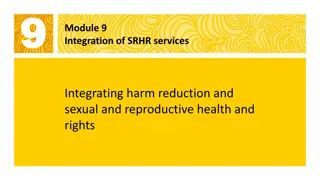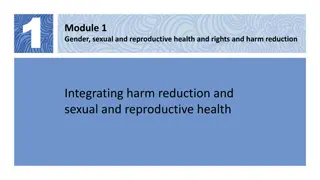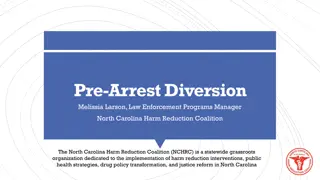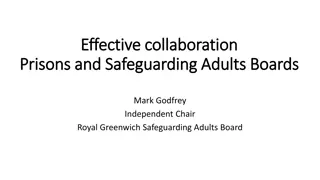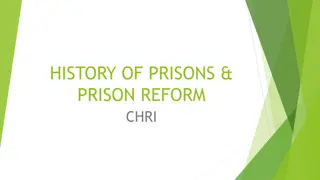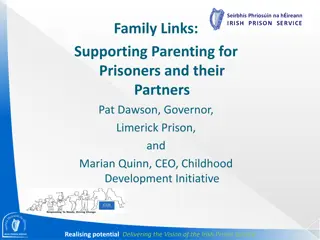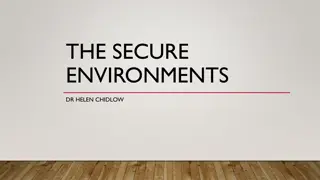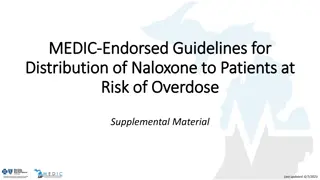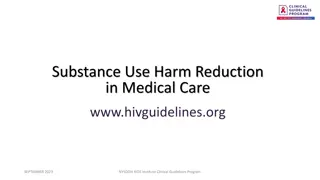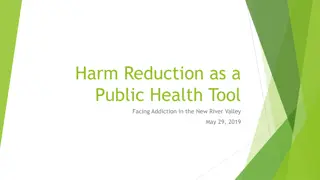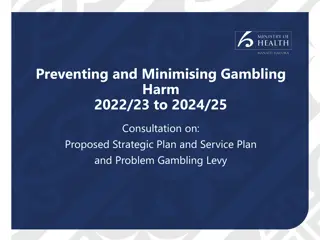Supporting Harm Reduction and Health Care in Prisons
PASAN (Prisoners with HIV/AIDS Support Action Network) in Ontario exclusively works with prisoners and ex-prisoners to provide support, education, and advocacy related to HIV/HCV and harm reduction. They aim to ensure healthcare access and continuity of care for prisoners living with HIV/HCV, combat stigma and discrimination, and provide vital information on health issues inside prisons. The organization engages in capacity building and training to improve correctional policies and practices.
Download Presentation

Please find below an Image/Link to download the presentation.
The content on the website is provided AS IS for your information and personal use only. It may not be sold, licensed, or shared on other websites without obtaining consent from the author. Download presentation by click this link. If you encounter any issues during the download, it is possible that the publisher has removed the file from their server.
E N D
Presentation Transcript
Harm Reduction on The Inside P A S A N Lindsay Jennings HSJCC January 4, 2018
P A S A N PASAN(Prisoners with HIV/AIDS Support Action Network) is a community-based organization in Ontario that provides support, education and advocacy services related to HIV/HCV and harm reduction with the prisoner populations and within the prison environments. and ex-prisoner
P A S A N PASAN is the only organization in Canada that exclusively works with prisoners and ex-prisoners around HIV/HCV and harm reduction. We strive to ensure that prisoners living with HIV/HCV are receiving the healthcare and support that they deserve and are entitled to; as well, to facilitate continuity of care when people are returning back into the outside community.
OUR GOAL We aim to engage corrections to exchange information and to have an impact on correctional policies and practices that have a negative impact by upholding stigma and discrimination for prisoners living with HIV/HCV, or being a prisoner inside a jail We carry out capacity building training and workshops in the community for agencies that work with people who are in and out of prison.
On the Inside Through opportunities for prisoners to learn about and discuss topics such as; HIV/HCV-transmission and prevention, testing and treatment Sexual health- general health Harm Reduction- safer drug use/sex/tattooing/selfharming Overdose Prevention Reintegration Plans- informal unless its healthcare related Informally discuss trends or situations that are happening inside the jail, and how it is affecting prisoners education sessions inside prison, we provide
HIV/HCV & IN PRISON Many of the dynamic factors that lead to poor health processes of marginalization, illicit substance use, poverty, early childhood trauma, homelessness are associated with increased likelihood of incarceration and higher risk of contracting HIV or HCV. Prisoners may not have access to basic tools to manage their health care Stigma, overcrowding, limited access to health care, and the stress of incarceration contribute to the vulnerable health status of prisoners and ex-prisoners Healthcare or maintenance of their HIV status looks different when incarcerated Provincial Prisoners are not eligible for HCV treatment
War on Drugs Legislation of marijuana- how is this going to affect our justice systems Criminalization of drug users Manslaughter charges for fentanyl trafficking charges Mental health and drug use which came first?
One Day at a Time Non conducive to rehabilitation 12-14 hrs min lockup, otherwise locked out Yard, lockdown, programs, school, visits, hygiene General population vs. protective custody Pat downs, cell searches, strip searches, random urinalysis Segregation Crime school Double-bunking-against U.N. standards
Subculture and Unwritten Rules Confidentiality Currency (sex, meds, 3-way calls, food, canteen,etc.) Doing your own time Violence, Muscling The notion of being solid Racking up debts (drugs, tobacco, etc.) Pecking order
Effects of Institutionalization Sense of space Pace of life Squeaky wheel gets the grease Authority figures Lack of socialization, input, control Grooming Hoarding Language Post-Incarceration Syndrome (PICS)
Transitioning back into the Community ID replacement, housing, employment, clothing, transportation, ODSP, $$$ Healthcare appointments Overdose risks Factors for recidivism Stigma Released from court, property Support around addictions Support around trauma
Relationships Challenges The relationship between prisoners and healthcare providers is generally not positive. There is often mistrust due to poor treatment and/or previous negative experiences, including being labelled as drug-seeking, manipulative and/or criminals. When out of prison, some people have significant challenges around getting to and keeping appointments due to poverty, cognitive challenges and geographical location (i.e. rural, remote, underserved areas). The prison environment socializes people to tell authority figures what they think they want to hear in order to get their needs met.
Important Things to Consider The role of trauma, both in early life and throughout life, and how that impacts self-esteem, behaviour, decision- making and judgement. The ways that prison subculture, range survival and institutionalization impact behaviour. The stigmatization and general feeling of powerlessness people feel inside and post-release from prison. The complexity of sexual orientation identity in prison and post-release from prison.
Things That Are Non-Conducive to Building Trust Asking an ex-prisoner what they did time for Breaching confidentiality Asking about another prisoner Making promises you can t keep Rationalizing punishment Accepting prison staff reports about a person s behaviour without listening to the person s perspective in privacy Speaking down to a person Imposing your views or moral standards
Some Quick Tips - 1 CHALLENGE: People seem like they are over-emphasizing one aspect of their health or seem like they are not being forthcoming with information. SUGGESTION: As part of being institutionalized, prisoners learn to prioritize one thing and highlight it as a way to get their needs met. Understand the series of events that have occurred in a person s life by allowing time for a person to give a brief biographical narrative and pay specific attention to traumatic areas of their narrative.
Some Quick Tips - 2 CHALLENGE: People often present as non-communicative and non-cooperative while interacting with you. SUGGESTION: Be sensitive to the reality that the person may have a heightened sense of anxiety and mistrust due to their past experiences. Understand the possibility of fear of being judged and fear of being criminalized. Always use a non-judgemental approach, outline confidentiality and emphasize that the more you know, the more you can help the person.
Some Quick Tips - 3 CHALLENGE: People aren t consistent with showing up for appointments/court dates. SUGGESTION: Make sure that you take the time to explain procedures, diagnoses, treatments and results and ensure the person understands the information and their options.
Some Final Things to Consider - 1 Prisoners and ex-prisoners often normalize not feeling okay and minimize symptoms that they are experiencing. When people are ready or desperate to address their health issues, they need an anchor because they may have no idea where to start, what to tell or what to ask. When people are released from prison, they usually do not have identification because it has either been lost in the prison or confiscated/destroyed by police during arrest or they were released from court without their personal belongings.
Some Final Things to Consider - 2 The waiting room/courthouse/intake rooms can be a place of high anxiety due to being in close proximity to people, feeling judged or paranoid, nervousness about the interaction with the worker or simply the act of waiting can be stressful. Healthcare environments or any place that can feel institutional can resemble the prison environment in overt or nuanced ways. When people are spoken down to or belittled, this can trigger past experiences with prison guards.
Contact PASAN www.pasan.org 416-920-9567 or 1-866-224-9978 lindsay@pasan.org



